一般将来时 初中语法
初中英语语法一般将来时

初中英语语法一般将来时【初中语法系列】一般将来时,结构是重点!一般将来时是初二英语要研究的内容,在初中整个语法系统中占非常重要的内容,也是历次考试的高频考点.1一般将来时的含义一般将来时表示将来某个时间要发生的动作或状态,或将来经常发生的动作或状态。
2一般将来时的基本结构1. will/shall+动词原形will在陈述句中用于各种人称;shall用于第一人称,常被will所代替。
否定式:will not=won'tshall not=shan't一般疑问式:will/shall+主语+动词原形+其他?特殊疑问式:特殊疑问词+一般疑问式?I will/shall do a better job next time.下次我要做得好些。
Oil and water will not mix.油和水没法混在一起。
—Will he help you with your English tonight?今天晚上他会帮助你研究英语吗?—Yes, he will./No, he won't.是的,他会。
/不,他不会。
—When will you arrive for America?你什么时候去美国?—Tomorrow.来日诰日。
2. am/is/are going to +动词原形否认式:am/is/are not going to +动词真相普通疑问式:am/is/are +主语+ going to +动词真相+其他?特殊疑问式:特殊疑问词+普通疑问式?He is going to spend his holidays in London.他打算在伦敦度假。
Look at the dark clouds. There is going to be a storm.看那乌云,快要下雨了。
Is he going to collect any data for us?他会帮我们搜集数据吗?What are you going to do tomorrow?明天你打算作什么?3will+动词原形与am/is/are going to +动词原形的用法区别will+动词原形与am/is/are going to +动词原形的用法虽然都表示将来发生动作或情况,一般情况下能互换。
六、一般将来时

初中基础语法——时态三、一般将来时概念:一般将来时表示将来某一时刻的动作或状态,或将来某一段时间内经常的动作或状态。
常常和表示将来的时间状语连用。
如:tomorrow(明天),next week(下周),from now on(从现在开始);in the future(将来)等。
一般将来时由助动词shall(第一人称),will(第二、三人称)动词原形构成。
基本构成:be going to表示主观的打算或计划。
shall和will 常常缩写成'll ,紧接在主语之后。
其否定式shall not 和will not 的缩写式分别为shan't 和won't。
be to表示客观安排或受人指示而作某事。
后+动词原形。
be about to+动词原形,意为马上作某事,不能与tomorrow,next week等表示明确将来时的时间状语连用。
句型:肯定句、否定句、疑问句被动句:will/shall+be+v.ed(及物动词过去分词)The letter will be sent tomorrow.这封信明天将寄出去We shall be punished if we break the rule.如果我们违反规定,我们将受到惩罚。
注意:will和shall在句子中所表达的“意志”是不同的,当句子主语是第一人称(I)的时候表示的是主语I 的自主“意志”,很多人可能会问什么是自主意志。
例:I will be clear tomorrow . 我会把这件事弄个水落石出(词句有多个意思,这里举此例)分析:这个句子中用will时,主语I(我)就带有强烈的意志,意思是我想让事情水落石出,并且有我会为此付诸努力的意思。
当第一人称,用shall的时候就是一个普通的句子,就没有主语的意志。
I shall come back in ten minutes .这句话就是单纯的说我会在10分钟后回来没有别的意思I will come back in ten minutes. 而这句话就有一种意境上的不同。
初中一般将来时讲解
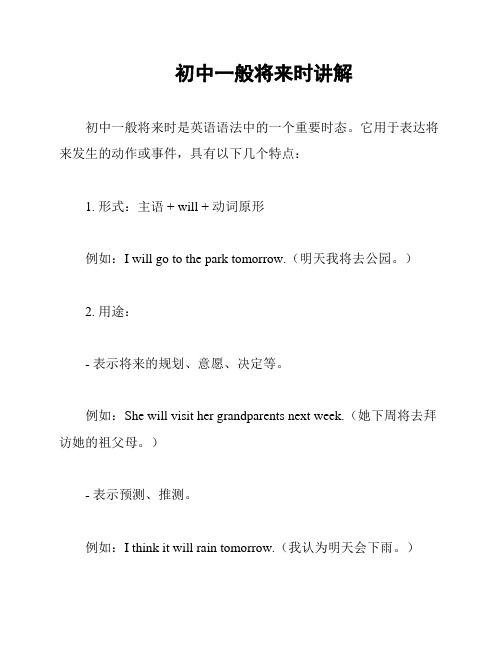
初中一般将来时讲解初中一般将来时是英语语法中的一个重要时态。
它用于表达将来发生的动作或事件,具有以下几个特点:1. 形式:主语 + will + 动词原形例如:I will go to the park tomorrow.(明天我将去公园。
)2. 用途:- 表示将来的规划、意愿、决定等。
例如:She will visit her grandparents next week.(她下周将去拜访她的祖父母。
)- 表示预测、推测。
例如:I think it will rain tomorrow.(我认为明天会下雨。
)- 用于官方通知、邀请、警告等场合。
例如:The school will hold a party next month.(学校下个月将举办一次聚会。
)- 用于做出决定或提供帮助。
例如:I will help you with your homework.(我将帮助你完成作业。
)3. 注意事项:- 表示将来的时间状语词一般使用,如tomorrow(明天)、next week(下周)等。
- 一般将来时常与表示将来的时间状语词或时间状语从句一起使用。
- 对于第一人称(I)和第二人称(you)的陈述句,可以使用缩略形式:I'll, you'll。
4. 示例:- She will go to the cinema this evening.- They will have a picnic in the park.- We will study Spanish next semester.- He will go on vacation next month.总之,初中一般将来时是英语语法中的重要时态,可以表达将来发生的动作或事件,同时也可以用于表示意愿、决定、预测等场合。
掌握这一时态的用法有助于学生加深对英语语法的理解。
初中数学一般将来时专项语法讲解

初中数学一般将来时专项语法讲解一般将来时是表示将来某个时间要发生的动作或事件。
在初中数学中,很多时候我们需要描述将要发生的事情,使用一般将来时就尤为重要了。
I. 构成方法一般将来时由“will/shall + 动词原形”构成。
其中 shall 用得较少,will 是最主要的情态动词。
例如:I will go to school tomorrow.陈述句否定句构成如下:陈述句:I will see you tomorrow.否定句:I will not see you tomorrow.疑问句构成如下:一般疑问:Will you see me tomorrow?(肯定回答:Yes, I will.否定回答: No, I won't.)特殊疑问:What will you do tomorrow? (回答:I will go to school.)II. 动词用法将来时态只是时间状语,用途相当于陈述一件在未来某个时间会发生的事情,如“明天”,“下周”等。
* 表示未来的计划或决定:I will travel next month.* 表示意愿或承诺:I will help you with your homework.* 表示在未来一段时间内会经常发生的动作、或在未来发生的动作是一种惯:He will play basketball every morning.* 表示未来某个时间衔接发生的动作:I will wake up, and then I will brush my teeth.* 表示偶然发生的事情:There will be a party at my friend's house tomorrow.III. 练题1. 我明天早上6点起床。
2. 他下下个月去伦敦。
3. 他会在这个周末打篮球。
4. 我会帮你研究数学。
5. 当你到机场时,我会等你的。
答案:1. I will wake up at 6 tomorrow morning.2. He will go to London next month.3. He will play basketball this weekend.4. I will help you with studying mathematics.5. I will wait for you when you arrive at the airport.初中数学一般将来时是数学学习中的重要部分,希望这份语法讲解能帮助学生更好地掌握此知识点。
八年级一般将来时知识点

八年级一般将来时知识点一、一般将来时的概念一般将来时(Simple Future Tense)是指在现在或将来某一时间发生的动作或状态。
它表示将来的事情或者打算、意图、承诺、预测等含义。
在句子中通常用will或shall加动词原形来表示。
例如:1. I will go to the cinema tonight. 今晚我要去电影院。
2. She will be a doctor when she grows up. 她长大后要成为一名医生。
二、will和shall的用法1. 表示意愿、决心等。
例如:I will help you with your homework.我会帮你做作业。
2. 表示承诺或提议等用法。
例如:I shall be there on time.我会准时到那儿。
Shall we go to the park tomorrow?我们明天去公园好吗?3. 在口语中,will常用于表示将来事件。
例如:It will rain tomorrow.明天会下雨。
4. shall在现代英语中已经不常用,一般只在特殊疑问句或回答中使用。
例如:Shall I open the window?我该打开窗户吗?Yes, you shall.是的,你该打开。
三、构成方法形式:will / shall + 动词原形例如:I will go to Paris next month. 下个月我要去巴黎。
He shall be here soon. 他马上就要来了。
注意:一般将来时中,主语部分要与will或shall连用,不可以出现be动词或助动词do/does/did等。
四、常用的表示将来的时间状语1. tomorrow 明天例如:She will be back tomorrow. 她明天回来。
2. next week/month/year 下周/月/年例如:We will visit them next month. 我们下个月去探望他们。
初二英语语法分析--一般将来时用法讲解
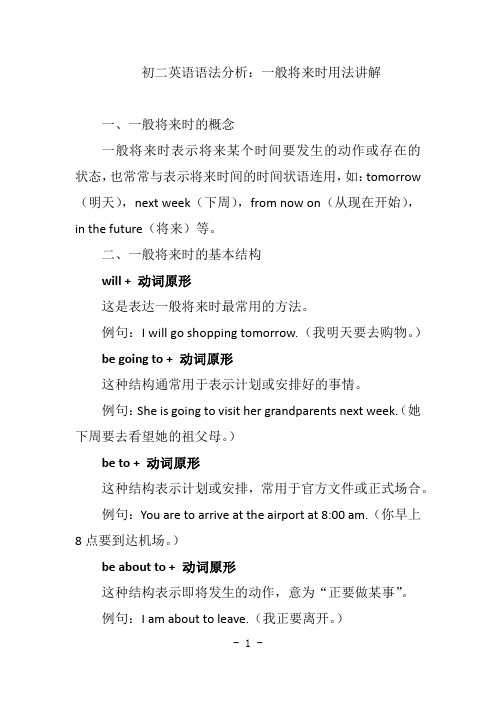
初二英语语法分析:一般将来时用法讲解一、一般将来时的概念一般将来时表示将来某个时间要发生的动作或存在的状态,也常常与表示将来时间的时间状语连用,如:tomorrow (明天),next week(下周),from now on(从现在开始),in the future(将来)等。
二、一般将来时的基本结构will + 动词原形这是表达一般将来时最常用的方法。
例句:I will go shopping tomorrow.(我明天要去购物。
)be going to + 动词原形这种结构通常用于表示计划或安排好的事情。
例句:She is going to visit her grandparents next week.(她下周要去看望她的祖父母。
)be to + 动词原形这种结构表示计划或安排,常用于官方文件或正式场合。
例句:You are to arrive at the airport at 8:00 am.(你早上8点要到达机场。
)be about to + 动词原形这种结构表示即将发生的动作,意为“正要做某事”。
例句:I am about to leave.(我正要离开。
)be due to + 动词原形这种结构表示某事预定或预期将要发生。
例句:The train is due to arrive at 5:00 pm.(火车预定下午5点到达。
)三、一般将来时的用法1表示将来的动作或状态例句:I will buy a new car next year.(明年我要买一辆新车。
)2表示将来的计划或安排例句:We are going to have a picnic this weekend.(我们这个周末要去野餐。
)3表示根据现有情况推测未来的可能性例句:It's going to rain soon.(很快就要下雨了。
)4表示命令、请求、建议等例句:You are to finish your homework before you go out.(你出去之前要把作业做完。
初中英语语法一般将来时

一般将来时一.一般将来时的定义:表示将来某一个时间将要发生的动作或存在的状态,表示将来经常或重复发生的动作。
二.一般将来时的标志:tomorrow(明天),the day after tomorrow(后天)next year(明年)next month(T—个月)next week(下一个星期)3.一般将来时的构成:1.主语^be(am,is,are)going to+动词原形+..例如:(1).I am going to play football tomorrow.明天我将要踢足球.(2).She is going to watch a movie the day after tomorrow.后天她要看一场电影.2.主语+will/shall+动词原形+.....说明:(l).will/shall有时可以和be going to互换;(2) .will是万能的,shall只能用在第一人称,主语是I,we.(3) .will和shall的后而接动词原形)例如shall/will go to Beijing next month.。
will=I11)下个月我将要去北京.(2) .You will come to see me tomorrow.(you will=you'll)明天你将要来看我.(3) .She will read English tomorrow moming.(She will=She'll)明天早上她将要读英语.四.句一般将来时的式:1.肯定句:(1) ..主语+be(am,is,are)going to+动词原形+......(2) ..主语+will/shall+动词原形+.....例句和上面一样,就不举了.2.否定句:(1)..主语+be(am,is,are)not going to+动词原形+......例如:(A):I am not going to play basketball tomorrow.明天我不将踢足球.(B).She is not/isn't going to visit Shanghai next year.明年她不将参观上海.(2)..主语+will/shall not+动词原形+.....(A).I shall not go to school the day after tomorrow o后天我不将上学了(B).I will not write my homework this evening.(will notl=I won't)今晚我不将写作业(C).She will not see a movie next week.(will not=won't)下个星期她将不看一场电影.3.一般疑问句:(A).Am/Is,Are+主语+going to+动词原形+....例如(A).—Am I going to see my grandfather tomorrow?明天我将去看我的爷爷吗?—Yes,you are.是的,你将去.(B).— Are you going to listening to the tape tomorrow?明天你将听录音带吗?—No,I am not.不,我不将.(C). —Is she going to Beijing next year? 明年我将去北京吗?-Yes,she is.是的,她将.(2).Will//shall+主语+动词原形+…例如(A). —Shall we play volleyball next class?下一节课我们将打排球吗?-Yes,you will,是的,你们将.(B). —Will you come here next week?下个星期你将来这儿吗?-Yes,I will.是的,我将.(C).--Will she teach us this term?这学期,她将教我们吗?—Yes,she will.是的,她将.4.特殊疑问句:(1).What(Where,How...)+be(am,is,are)+主语+going to+动词原形+...?例如:(A).—What are you going to do tomorrow? 明天你将要做什么?—rm going to the park? 我将要去动物园.(B).--Where are you going to swim? 你将要去哪儿游泳?—I'm going to swim in the river.(2). What(When,Where,How...)+主语+动词原形+...?例如:(A).---What will you do next week?下个星期你将要做什么?--1 will do my homeworko 我将要做作业.(B).—How will she come here tomorrow?明天她将要怎么来这儿?—She will come here by bus 。
一般将来时态知识点详解(初中英语专项复习) (4)
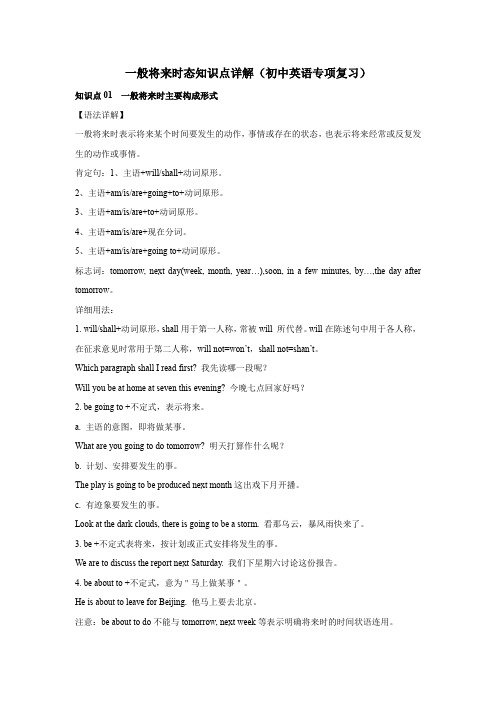
一般将来时态知识点详解(初中英语专项复习)知识点01 一般将来时主要构成形式【语法详解】一般将来时表示将来某个时间要发生的动作,事情或存在的状态,也表示将来经常或反复发生的动作或事情。
肯定句:1、主语+will/shall+动词原形。
2、主语+am/is/are+going+to+动词原形。
3、主语+am/is/are+to+动词原形。
4、主语+am/is/are+现在分词。
5、主语+am/is/are+going to+动词原形。
标志词:tomorrow, next day(week, month, year…),soon, in a few minutes, by…,the day after tomorrow。
详细用法:1. will/shall+动词原形,shall用于第一人称,常被will 所代替。
will在陈述句中用于各人称,在征求意见时常用于第二人称,will not=won’t,shall not=shan’t。
Which paragraph shall I read first? 我先读哪一段呢?Will you be at home at seven this evening? 今晚七点回家好吗?2. be going to +不定式,表示将来。
a. 主语的意图,即将做某事。
What are you going to do tomorrow? 明天打算作什么呢?b. 计划、安排要发生的事。
The play is going to be produced next month这出戏下月开播。
c. 有迹象要发生的事。
Look at the dark clouds, there is going to be a storm. 看那乌云,暴风雨快来了。
3. be +不定式表将来,按计划或正式安排将发生的事。
We are to discuss the report next Saturday. 我们下星期六讨论这份报告。
初中科学一般将来时
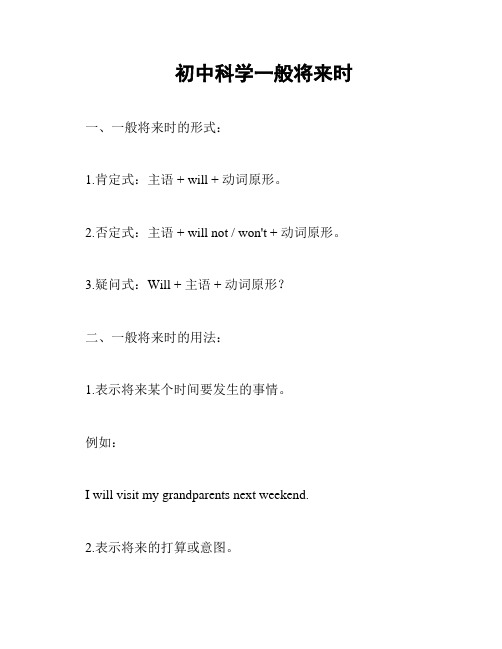
初中科学一般将来时一、一般将来时的形式:1.肯定式:主语 + will + 动词原形。
2.否定式:主语 + will not / won't + 动词原形。
3.疑问式:Will + 主语 + 动词原形?二、一般将来时的用法:1.表示将来某个时间要发生的事情。
例如:I will visit my grandparents next weekend.2.表示将来的打算或意图。
例如:He will study hard to pass the exam.3.表示一种预测或猜测。
例如:It will rain tomorrow.4.表示将来的惯或反复发生的动作。
例如:We will often go skating in winter. 三、一般将来时的注意点:1.将来时中有一些词,如:tomorrow, next week, next year 等,这些词本身已经表示将来的意思,所以一般将来时和这些词连用时,不需要在句中再用将来时。
例如:I will meet her tomorrow.2.在表示将来的时间的副词或短语中,要用一般现在时,而不是将来时。
例如:我会在他来的时候离开。
3.用于一般将来时的时间状语词:in the future(将来),tonight(今晚),next time(下次),soon(不久),tomorrow(明天),the day after tomorrow(后天),the day before yesterday(前天)等。
四、常见的一般将来时动词:1.动词接不定式,如:want, plan, hope, expect, promise, decide 等。
例如:I will help you with the housework.2.表示动作的持续或重复的动词,如:work, stay, live, play, swim 等。
例如:He will work hard in the future.例如:初中学生学习一般将来时,需要掌握以上的重点内容,同时注意词汇的积累和句型的多样化。
初中英语语法复习:一般将来时

初中英语语法复习:一般将来时一般将来时表示将来某一时刻的动作或状态,或将来某一段时间内经常的动作或状态。
常与一些表示将来的时间状语连用,如:tomorrow(明天),next week(下周),from now on(从现在开始);in the future(将来),in a few days等。
1、基本结构:be going to+动词原形 2. will+动词原形一般将来时:be going to+动词原形一般将来时:will+动词原形2. will 和be going to 的区别will 和be going to一般可以互用,但有时有区别:1)含时间和条件状语从句,如果主句是将来时,多用will.2)如果不是以人的意愿为转移,将来肯定会发生的动作和状态,多用will3)be going to根据迹象推测,有可能发生的事情或计划要做的事情。
3. there be 句型的一般将来式:1.There is/are going to be 2. There will be一、单项选择1.The old scientist ______ us a talk on future life next week.A.gives B.gave C.will give D.is giving2.—Jim, what are you going to do this weekend?—I ______ a movie with my dad.A.am watching B.watch C.watched D.am going to watch3.—Where’s mum?—She is trying on the new dress upstairs now. She _________ it to a party.A.wears B.wore C.will wear D.is wearing4.—What are you going to do next weekend?—There __________ a basketball match next Sunday. I want to watch it.A.will be B.will have C.is going to have D.are going to be 5.—Which team ________ the football match?—I’m not sure. The two teams both play well. Let’s wait and see.A.wins B.won C.is winning D.will win 6.Robots ________ us do some heavy and difficult jobs in the future.A.help B.helped C.are helping D.will help7.—What are you going to do next weekend, Wang Hui?—I ________ my grandparents next Sunday.A.visit B.visitedC.am visiting D.am going to visit8.I don’t know if it ________ sunny tomorrow. If it ________ sunny, I will go fishing. A.will be; is B.is; will beC.will be; is going to be D.is; is9.We are going to have a farewell party ________.A.now B.every day C.last week D.next Friday 10.There is going to ________ a basketball match tomorrow.A.be B.have C.is D.are11.Look at the dark clouds in the sky. It ________.A.is going to rain B.rained C.raining D.rainy 12.What ________you ________for tomorrow’s party?A.did; wear B.will; wear C.do; going to wear D.do; do13.He ________ busy this week. He ________ free next week.A.is; is B.will; will be C.is; will be14.There are many black clouds in the sky. It ________ soon.A.will rain B.rains C.rained D.is raining 15.It ________ warm in Dalian tomorrow.A.will be B.is C.does16.She will ________ a book about animals after school.A.buys B.buy C.is buy D.going to buy 17.Mike ________ his room yesterday, and he is going to ________ his homework tomorrow. A.cleaned; do B.cleaned; did C.clean; do18.—Our library is bright and beautiful.—Yes. Will you ________ us ________ it?A.shows; to B.show; aroundC.shows; around D.show; to19.Look! There are a lot of clouds in the sky. It is going to _______ soon.A.rains B.rainy C.be raining D.be rainy20.Li Ming ______ a T-shirt tomorrow.A.buys B.bought C.buy D.will buy 21.Sarah and I ______ a film next Sunday. We ______ horses last Sunday.A.am going to see; rode B.are going to see; rode C.will see; ride 22.—What are you going to do this weekend?—_______A.I’m going to visit my grandparents.B.I’m fine.C.I’m watching TV.D.I’m cleaning the room.23.—Peter! What is your plan for this Sunday?—I ________ my grandmother. She is in hospital.A.visit B.am visiting C.am going to visit 24.It’s cloudy all day today, but it ________ tomorrow.A.changes B.changed C.will change D.is changing 25.—Can your sister ________?—No, she can’t. But she ________ to swim next month.A.swims; is learning B.swim; is learningC.swims; is going to learn D.swim; is going to learn26.—When ________ you come back from London, Mary?—Last week. The River Thames is really beautiful and I ________ it again.A.do; visit B.did; visit C.do; am visiting D.did; will visit 27.This is our last night in China. We ________ home tomorrow.A.will fly B.fly C.flies D.flew 28.—Schools ________ different in the future.—Yes, you are right.A.is B.are C.were D.will be 29.—Why are you in a hurry, Cindy?—There ________ a basketball match between Class One and our class at 3 o’clock.A.are going to be B.will haveC.is going to have D.will be30.Tony _________ the Great Wall with his classmates next Sunday morning.A.visited B.visits C.will visit D.visit31.There ________ a sports meeting in our school next week.A.was B.were C.are D.is going to be 32.You can borrow this film—surely you _________ watching it.A.enjoy B.enjoyed C.will enjoy D.are enjoying 33.—Why are you in such a hurry, Peter?—I________ a basketball match between Class One and our class in ten minutes.A.join in B.am joining in C.joined in D.am going to join in 34.Robots and machines people do more work in the future.A.help B.will help C.are helping D.helped 35.After this exam, you ________ a wonderful holiday next month. Take it easy!A.have B.has C.had D.will have36.If it ______ rain tomorrow, my family ______ go for a walk in the park.A.isn’t, will B.doesn’t, willC.won’t, will D.won’t be, will37.—It’s hot here.—I ________ and open the window.A.go B.went C.am going D.will go 38.—When ________ Lingling ________ litter with her friend?—Next Saturday morning.A.does; collect B.did; collect C.will; collect D.is; collecting 39.Perhaps we ________ able to connect our minds to the Internet in the future.A.are B.were C.have been D.will be 40.—What’s your plan for the new term?—I ________ English well.A.learn B.learnedC.am learning D.am going to learn41.—Are you free? I’d like you to go to the museum with me.—Sorry, there _______ some important meetings this coming weekend.A.is going to have B.will have C.are going to be D.is going to be 42.There ________ schools in the future. Students will study at home.A.is going to have B.will be C.won’t have D.won’t be 43.—How will students learn then?—They ________ by computers in the classroom.A.studies B.studied C.will study D.is studying 44.—What are you going to do, Betty?—I’m going ________ football this afternoon.A.play B.to play C.played D.playing45.We hope ________ a computer on every student’s desk in the future.A.there is B.there wasC.there will have D.there will be46.—What are you going to do this Sunday?—I ________ a picnic with my parents.A.have B.had C.am having D.am going to have 47.We hope there ________ a war in the world. Everyone can live a happy life.A.will not have B.will be not C.is not going to be D.is not going to have 48.If you interview the estate agent, he ________ you much information about housing. A.gives B.gave C.will give D.is giving 49.—The radio says it ________ rain this afternoon, isn’t it?—No. I think it will be sunny.A.will go to B.is going to C.shall go to D.will be 50.Where __________ you __________ have a meeting tomorrow?A.do; go B.will; go C.are; go D.are; going to二、完成句子51.My mother will be back in an hour. (改为否定句)My mother back in an hour.52.The students will study at home in the future. (改为一般疑问句)the students at home in the future?53.Things will be different in the future. (变为一般疑问句)things in the future?54.There is a football match at the sports hall every day.(用tomorrow改写句子)a football match at the sports hall tomorrow.55.Alice is going to do her homework this afternoon. (改为—般疑问句)Alice her homework this afternoon?56.They are going to take a walk in the park. (就划线部分提问)they to in the park?57.They will meet at the school gate at 7 a.m. on Saturday. (对画线部分提问)they at the school gate?58.I’m going to learn English well because it’s very useful.(对划线部分提问)you going to learn English well?初中英语语法复习:一般将来时答案1.C【详解】句意:下周这位老科学家将给我们做一个关于未来生活的报告。
完整)初中一般将来时讲解
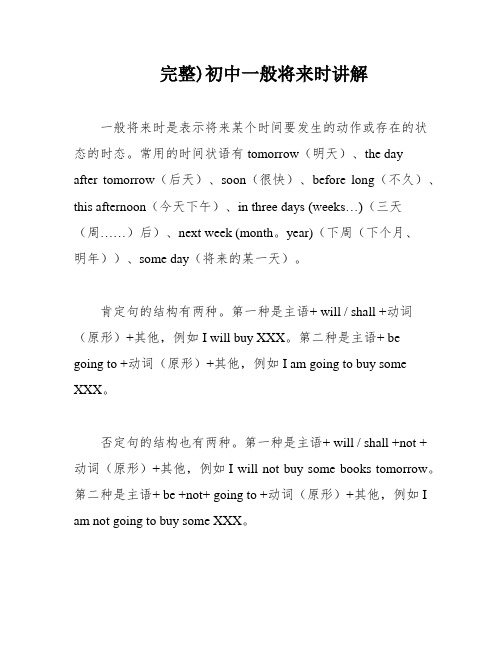
完整)初中一般将来时讲解一般将来时是表示将来某个时间要发生的动作或存在的状态的时态。
常用的时间状语有tomorrow(明天)、the dayafter tomorrow(后天)、soon(很快)、before long(不久)、this afternoon(今天下午)、in three days (weeks…)(三天(周……)后)、next week (month。
year)(下周(下个月、明年))、some day(将来的某一天)。
肯定句的结构有两种。
第一种是主语+ will / shall +动词(原形)+其他,例如I will buy XXX。
第二种是主语+ be going to +动词(原形)+其他,例如I am going to buy some XXX。
否定句的结构也有两种。
第一种是主语+ will / shall +not +动词(原形)+其他,例如I will not buy some books tomorrow。
第二种是主语+ be +not+ going to +动词(原形)+其他,例如I am not going to buy some XXX。
疑问句的结构也很简单。
第一种是Will / Shall +主语+动词原形+其他…?例如XXX?第二种是Be +主语+going to +动词原形+其他…?例如Are you going to buy some books tomorrow?肯定回答有两种方式。
第一种是Yes,主语+will,例如Yes。
I will。
第二种是Yes,主语+ be,例如Yes。
I am。
否定回答也有两种方式。
第一种是No,主语+will +not,例如No。
I will not。
第二种是No,主语+be + not,例如No。
I am not。
除了一般将来时,还有其他表示将来的时态,如be going to、be to(高中)、be about to(初中)。
初中英语语法汇总(一般将来时)

初中英语语法汇总(一般将来时)初中英语语法汇总〔一般将来时〕一、一般将来时的定义一般将来时表示在如今看来即将要发生的动作或存在的状态。
常用时间副词tomorrow, soon或短语next year / week / month, in a few days, in the future, sometime 做状语。
二、一般将来时的基本用法及构成〔1〕一般将来时的基本用法是表示单纯的将来事实,由"will / shall + 动词原形'构成:〔shall只用于第一人称〕例句:We shall have a lot of rain next month. 下个月将下许多雨。
I think she will pass the exam. 我想他考试会及格的。
〔2〕"be going to+动词原形'用来表示事先考虑过的将要发生的动作以及已有迹象说明必将要发生的某事,意为"准备;就要'。
如:1. Were going to meet outside the school gate. 我们准备在校门口见面。
2. Look! Its going to rain. 瞧!快下雨了。
(3) 用"be to+动词原形'表示。
主要表示按打算或支配即将要发生的动作;有时也表示指令、禁止或可能性:He is to leave for Beijing tomorrow. 他确定明天去北京。
Tell him hes not to be back late. 告知他不准迟回。
(4) 用"be about to+动词原形'表示。
主要表示即将要发生的事:He is about to leave. 他即将要离开。
Sit down, everyone. The film is about to start. 大家坐好,电影马上就要开发始了。
注:该结构通常不与具体的时间状语连用:误:He is about to leave soon [tomorrow].另外,该结构在美国英语中还可表示"准备'(主要用于否认句):Im not about to lend him any more money. 我不准备再借给他任何钱。
初中英语一般将来时详细讲解

初中英语一般将来时详细讲解初中英语一般将来时(Simple Future Tense)用于表示将来某个时间会发生的动作或存在的状态。
下面是初中英语一般将来时的详细讲解:一、构成:1.一般将来时的肯定句结构为:主语 + will + 动词原形2.一般将来时的否定句结构为:主语 + will not (won't) + 动词原形3.一般将来时的疑问句结构为:Will + 主语 + 动词原形?二、用法:1. 表示未来的事实、计划或打算:①I will visit my grandparents next week.(我下周会去看望我的祖父母。
)②We will have a party on Saturday.(我们周六要开个派对。
)2. 表示预测或推测:①It will rain tomorrow.(明天会下雨。
)②He will probably be late for the meeting.(他可能会迟到会议。
)3. 表示意愿、请求、建议等:①Will you please help me with my homework?(你能帮我做作业吗?)②I will do my best to help you.(我会尽力帮助你。
)4. 表示承诺或威胁:①I will always love you.(我会永远爱你。
)②If you don't listen to me, I will tell the teacher.(如果你不听我的话,我会告诉老师。
)注意事项:1. 在一般将来时中,主语通常是第一人称(I/we)或第三人称(he/she/it/they),而第二人称(you)在肯定句和否定句中都是一样的。
2. 一般将来时的疑问句需要将助动词will放在句首。
3. 在一般将来时中,表示将来时间的副词或时间状语可以与will连用,如tomorrow, next week等。
三、总结:初中英语一般将来时用于表示未来某个时间会发生的动作或存在的状态,可以用于表达事实、计划、预测、意愿、请求等。
初中英语语法——一般将来时
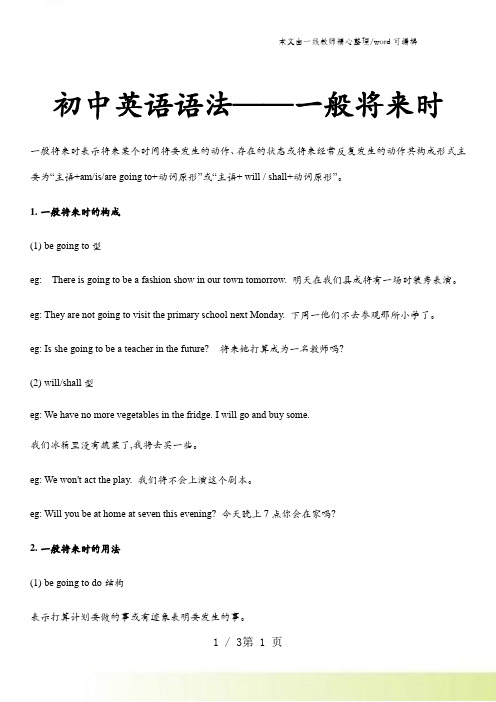
初中英语语法——一般将来时一般将来时表示将来某个时间将要发生的动作、存在的状态或将来经常反复发生的动作其构成形式主要为“主语+am/is/are going to+动词原形”或“主语+ will / shall+动词原形”。
1.一般将来时的构成(1)be going to型eg: There is going to be a fashion show in our town tomorrow. 明天在我们县成将有一场时装秀表演。
eg: They are not going to visit the primary school next Monday. 下周一他们不去参观那所小学了。
eg: Is she going to be a teacher in the future? 将来她打算成为一名教师吗?(2)will/shall型eg: We have no more vegetables in the fridge. I will go and buy some.我们冰箱里没有蔬菜了,我将去买一些。
eg: We won't act the play. 我们将不会上演这个剧本。
eg: Will you be at home at seven this evening? 今天晚上7点你会在家吗?2.一般将来时的用法(1)be going to do结构表示打算计划要做的事或有迹象表明要发生的事。
eg: I'm going to ski tomorrow.明天我要去滑雪。
(计划、打算)eg: It' s going to be a fine day tomorrow. 明天将会是个好天气。
(迹象表明要发生)(2) will /shall do 结构will/shall do 结构表示未经过事先考虑的意图,当主语是第一人称时用shall, will 可用于各种人称。
eg: How long will the work take? 这项工作要花多长时间? (推测)eg: From now on I will shall come for the newspapers every Monday.从现在起,我每周一都来拿报纸。
初中英语语法-一般将来时

一般将来时1. 用will/ shall do表示将来:shall 用于第一人称,will用于第二、三人称。
shall, will的缩写形式为’ll, 如:I’ll, you’ll等。
Shall not的缩写式为:shan’t, will not 的缩写式为:won’t . 一是表示预见You will feel better after taking this medicine.Do you think it will rain?二是表示意图.I will not lend the book to you.Take it easy,I will not do it any longer.基本结构:She will come to have class tomorrow.Will she come to have class tomorrow?She won’t come to have class tomorrow.What will she do tomorrow?2.用be going to do表示将来:肯定形式:①am/is/are going to + do;否定形式:①am/is/are going not to + do主要意义,一是表示―意图‖,即打算在最近的将来或将来进行某事。
Are you going to post that letter?How long is he going to stay here?I am going not to book a ticket.另一意义是表示―预见‖,即现在已有迹象表明将要发生或即将发生某种情况。
It’s going to rain.George is putting on weight; he is going to be quite fat.3.用be doing表示将来:主要意义是表示按计划、安排即将发生的动作,常用于位置转移的动词。
中考语法复习 一般将来时(附中考真题及解析)

中考语法复习一般将来时(附中考真题及解析)一、一般将来时1.概念:一般将来时表示将来某一时刻的动作或状态,或将来某一段时间内经常的动作或状态。
2.一般将来时的三种意义:预测(prediction):表示说话人认为将会发生某件事,即是表示猜测将来某事发生的可能性如:It will rain later.一会会下雨。
事先计划(future plan):表示说话人在头脑里已经决定好将来要做某件事如:My holiday is so long , and I am going to travel.意愿(willingness):表示说话人既不是预计某事将会发生,也不是预计经过考虑决定将做某事,而是在说话的时刻立即表明他将去做某事如:Someone is knocking at the door, I will go and open it.二、一般将来时结构一般将来时常常和表示将来的时间状语连用。
英式英语第一人称用shall,第二、三人称用will,而美式英语则不管什么人称,一律用will。
如:tomorrow(明天),next week(下周),from now on(从现在开始);in the future(将来)等。
⒈主语+ be going to do 表示主观的打算或计划。
⒉主语+ shall/will + do sth 其否定式shall not 和will not 的缩写式分别为shan't 和won't。
⒊ be 主语+ to do 表示客观安排或受人指示做某事或已安排好要在将来发生的事,是比较正式的用法。
如:They are to go on a strike on July 8.She is to be married next month.You are to finish your homework before you go to play.⒋主语+ be about to do,意为马上作某事,不能与tomorrow,next week 等表示明确将来时的时间状语连用,意思为“正要,马上就要”。
初中英语语法——一般将来时详细讲解
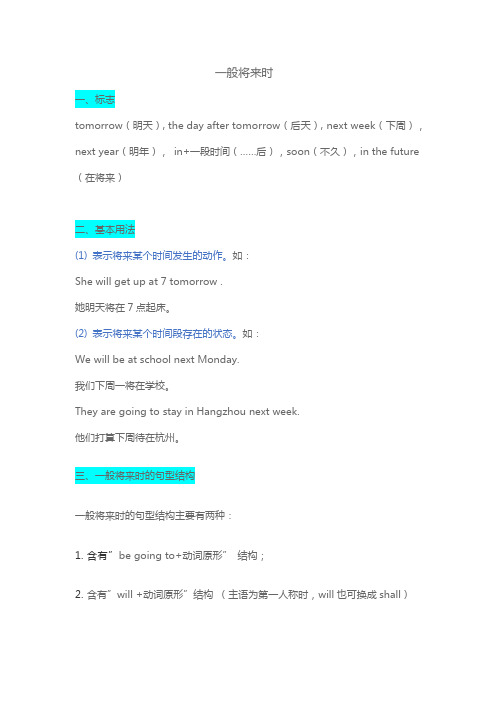
一般将来时一、标志tomorrow(明天), the day after tomorrow(后天), next week(下周),next year(明年),in+一段时间(……后),soon(不久),in the future (在将来)二、基本用法(1) 表示将来某个时间发生的动作。
如:She will get up at 7 tomorrow .她明天将在7点起床。
(2) 表示将来某个时间段存在的状态。
如:We will be at school next Monday.我们下周一将在学校。
They are going to stay in Hangzhou next week.他们打算下周待在杭州。
三、一般将来时的句型结构一般将来时的句型结构主要有两种:1.含有”be going to+动词原形”结构;2.含有”will +动词原形”结构(主语为第一人称时,will也可换成shall)(1)肯定句:She is going to buy some vegetables tomorrow morning . 她打算明天上午买一些蔬菜。
(2)否定句:在be动词后加not。
is和are可以和not缩写为isn't,aren't。
She isn’t going to buy any vegetables tomorrow morning . 她明天上午不去买蔬菜。
(3)一般疑问句及其答语:将be动词放在句子开头,且首字母要大写,句末用问号。
肯定回答:Yes,主语的相应代词+am/is/are.否定回答:No,主语的相应代词+am not /isn't/aren't.—Is she going to buy any vegetables tomorrow morning?她打算明天上午去买一些蔬菜吗?—Yes,she is./No,she isn't. 是的,她打算去。
- 1、下载文档前请自行甄别文档内容的完整性,平台不提供额外的编辑、内容补充、找答案等附加服务。
- 2、"仅部分预览"的文档,不可在线预览部分如存在完整性等问题,可反馈申请退款(可完整预览的文档不适用该条件!)。
- 3、如文档侵犯您的权益,请联系客服反馈,我们会尽快为您处理(人工客服工作时间:9:00-18:30)。
初中英语一般将来时知识点的从零到精通的学习,有语法知识,有针对性的练习题,有答案!经本人整理,小孩练习,确实有用!肯定形式:①am/is/are going to + do;②will/shall + do.否定形式:①am/is/are not going to + do;②will/shall not + do.will (is going to) be一表将来某一个时间将要发生的动作或存在的状态二. 一般将来时的标志:tomorrow(明天),the day after tomorrow(后天)next year(明年)next month(下一个月)next week(下一个星期)三.一般将来时的构成:1.主语+be(am,is,are) going to+ 动词原形(do)+......2.主语+will/shall+ 动词原形(do)+.....说明:(1).will/shall有时可以和be going to 互换;(2).will是万能的,shall只能用在第一人称,主语是I,we.(3).will和shall的后面接动词原形(do))四.一般将来时的句式:1.肯定句:(1)..主语+be(am,is,are) going to+ 动词原形(do)+......(2)..主语+will/shall+ 动词原形(do)+.....2.否定句:(1)..主语+be(am,is,are) not going to+ 动词原形(do)+......(2)..主语+will/shall not+ 动词原形(do)+.....3.一般疑问句:(1).Am/Is,Are+主语+going to+ 动词原形(do)+....(2).Will//shall+主语+ 动词原形(do)+...4.特殊疑问句:(1).What (Where, How...)+be (am,is,are)+主语+ going to + 动词原形(do)+...?(2). What (When,Where,How...) +will/shall+ 主语+ 动词原形(do)+...?二、基本结构:①be going to + do;②will+ do.三、否定句:在be动词(am, is, are)后加not或will后加not成won’t。
例如:I’m going to have a picnic this afternoon.→I’m not going to have a picnic this afternoon.四、一般疑问句: be或will/shall提到句首,some改为any,and改为or,第一二人称互换。
例如:We are going to go on an outing this weekend.→Are you going to go on an outing this weekend?五、对划线部分提问。
一般情况,一般将来时的对划线部分有三种情况。
1. 问人。
Who例如:I’m going to New York soon.→Who’s going to New York soon.2. 问干什么。
What …do.例如:My father is going to watch a race with me this afternoon.→What is your father going to do with you this afternoon.3. 问什么时候。
When.例如:She’s going to go to bed at nine. →When is she going to bed?一表将来某一个时间将要发生的动作或存在的状态二. 一般将来时的标志:tomorrow(明天),the day after tomorrow(后天)next year(明年)next month(下一个月)next week(下一个星期)三.一般将来时的构成:1.主语+be(am,is,are) going to+动词原形+......例如:(1).I am going to play football tomorrow.明天我将要踢足球.(2).She is going to watch a movie the day after tomorrow.后天她要看一场电影.2.主语+will/shall+动词原形+.....** ***说明:(1).will/shall有时可以和be going to 互换;(2).will是万能的,shall只能用在第一人称,主语是I,we.(3).will和shall的后面接动词原形)例如:(1).I shall/will go to Beijing next month.(I will=I'll)下个月我将要去北京.(2).You will come to see me tomorrow.(you will=you'll)明天你将要来看我.(3).She will read English tomorrow morning.(She will=She'll)明天早上她将要读英语.四.句一般将来时的式:1.肯定句:(1)..主语+be(am,is,are) going to+动词原形+......(2)..主语+will/shall+动词原形+.....例句和上面一样,就不举了.2.否定句:(1)..主语+be(am,is,are) not going to+动词原形+......例如:(A): I am not going to play basketball tomorrow. 明天我不将踢足球.(B). She is not/isn't going to visit Shanghai next year. 明年她不将参观上海.(2)..主语+will/shall not+动词原形+.....(A). I shall not go to school the day after tomorrow。
后天我不将上学了(B). I will not write my homework this evening.(will notl=I won't) 今晚我不将写作业(C). She will not see a movie next week.(will not=won't)下个星期她将不看一场电影.3.一般疑问句:(1).Am/Is,Are+主语+going to+动词原形+....例如(A). --Am I going to see my grandfather tomorrow?明天我将去看我的爷爷吗?--Yes,you are.是的,你将去.(B).-- Are you going to listening to the tape tomorrow?明天你将听录音带吗?---No,I am not.不,我不将.(C). --Is she going to Beijing next year? 明年我将去北京吗?--Yes,she is. 是的,她将.(2).Will//shall+主语+动词原形+...例如(A). --Shall we play volleyball next class? 下一节课我们将打排球吗?--Yes,you will. 是的,你们将.(B). --Will you come here next week? 下个星期你将来这儿吗?--Yes,I will. 是的,我将.(C).--Will she teach us this term? 这学期,她将教我们吗?--Yes,she will. 是的,她将.4.特殊疑问句:(1).What(Where,How...)+be(am,is,are)+主语+going to+动词原形+...?例如:(A).--What are you going to do tomorrow? 明天你将要做什么?--I'm going to the park? 我将要去动物园.(B).--Where are you going to swim? 你将要去哪儿游泳?--I'm going to swim in the river.(2). What(When,Where,How...)+主语+动词原形+...?例如:(A).---What will you do next week?下个星期你将要做什么?---I will do my homework。
我将要做作业.(B).--How will she come here tomorrow? 明天她将要怎么来这儿?--She will come here by bus。
她将要乘公共汽车来这儿.补充说明有些词如:go(去),come(来),leave(离开),start(开始),arrive等用现在进行时表示将来时.例如: (1) She is coming here tomorrow.她明天将要来这儿.(2) When are you leaving here?你什么时间将要离开这儿?区别"Be going to+动词原形+..." 表示一个事先考虑好的意图,,相当于文中的"打算,计划,准备"例如:(1).I am going to spend my holiday in Beijing.(这里不能用will)我打算在北京度假.(2).Where are you going to spend your holiday?你将要到哪儿度假?3. 客观难以改变的事实,用will,而不用be going to .例如: (1).It will rain tomorrow. 明天将要下雨.(2).It will be Teachers' Day the day after tomorrow.后天将是教师节.(3).My birthday will come. 我生日将要到了.“will”句型与“be going to”句型,前者表示纯粹将来,后者表示打算、计划、准备做的事情,更强调主语的主观意愿。
例如:Tomorrow will be Saturday. 明天是周六了。
We are going to visit Paris this summer.今年夏天我们打算游览巴黎。
一般将来时练习一、用所给动词的一般将来时填空1. I ______(leave)in a minute. I ______(finish)all my work before I ______ (leave).2. —How long _______ you _______(study)in our country?—I _______(plan)to be here for about one more year.—I _______(hope)to visit the other parts of your country.—What ______ you ______(do)after you ______(leave)here?—I ______(return)home and ______(get)a job.3. I ______(be)tired. I ______(go)to bed early tonight.4. Mary’s birthday is next Monday, her mother _____(give)her a present.5. It is very cold these days. It ______(snow)soon.6. —_____ you _____(be)here this Saturday?—No. I ______(visit)my teacher.7. —______ I ______(get)you a copy of today’s newspaper?—Thank you.8. I am afraid there ______(be)a meeting this afternoon. I can’t join you.9. Mike ______(believe, not)this until he ______(see)it with his own eyes.10. Most of us don’t think their team ______(win).二、单项选择1. There __________ a meeting tomorrow afternoon.A. will be going toB. will going to beC. is going to beD. will go to be2. Charlie ________ here next month.A. isn’t workingB. doesn’t workingC. isn’t going to workingD. won’t work3. He ________ very busy this week, he ________ free next week.A. will be; isB. is; isC. will be; will beD. is; will be4. There ________ a dolphin show in the zoo tomorrow evening.A. wasB. is going to haveC. will haveD. is going to be5. –________ you ________ free tomorrow?– No. I ________ free the day after tomorrow.A. Are; going to; willB. Are; going to be; willC. Are; going to; will beD. Are; going to be; will be6. Mother ________ me a nice present on my next birthday.A. will givesB. will giveC. givesD. give7. – Shall I buy a cup of tea for you?–________. (不,不要。
